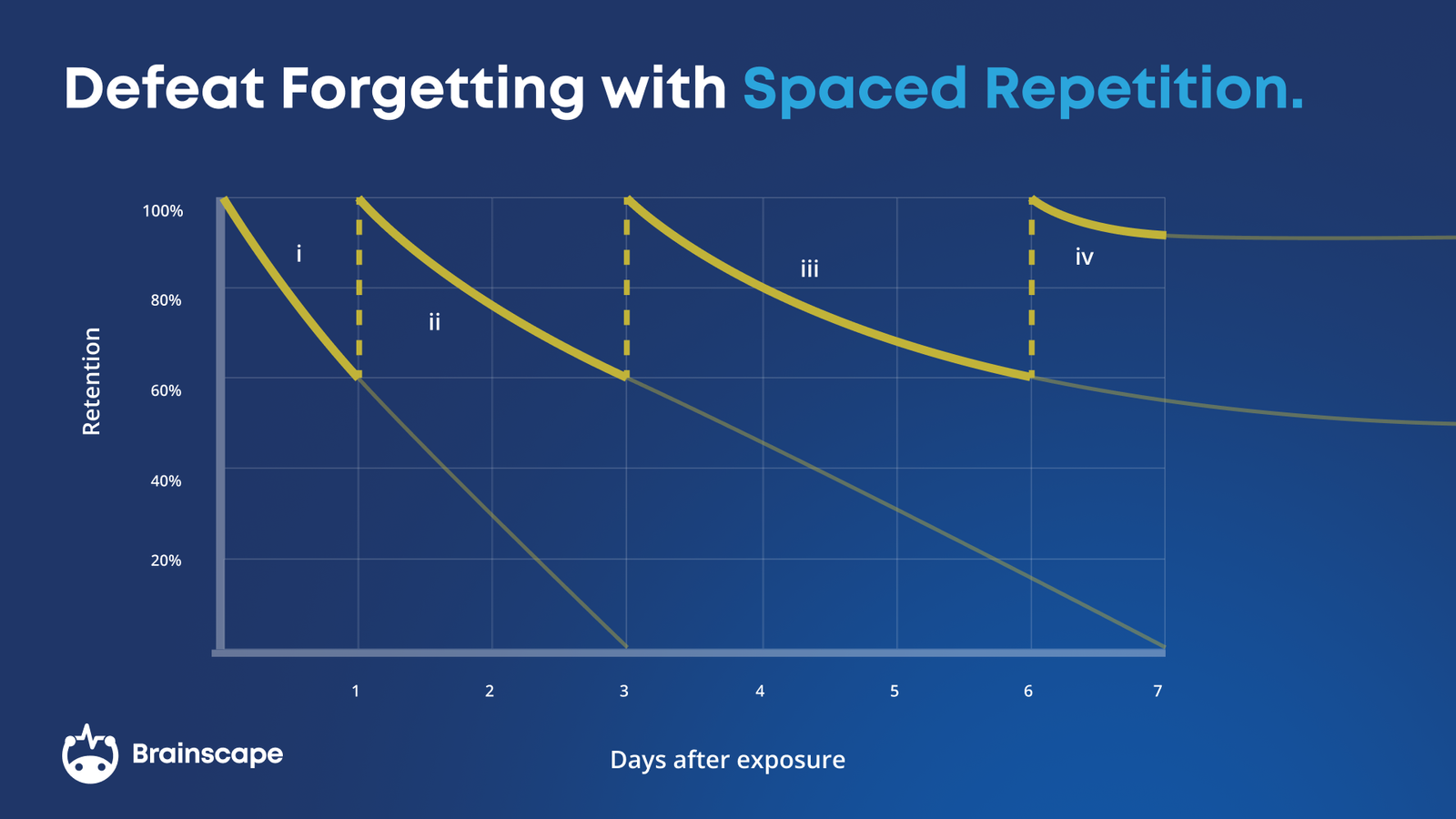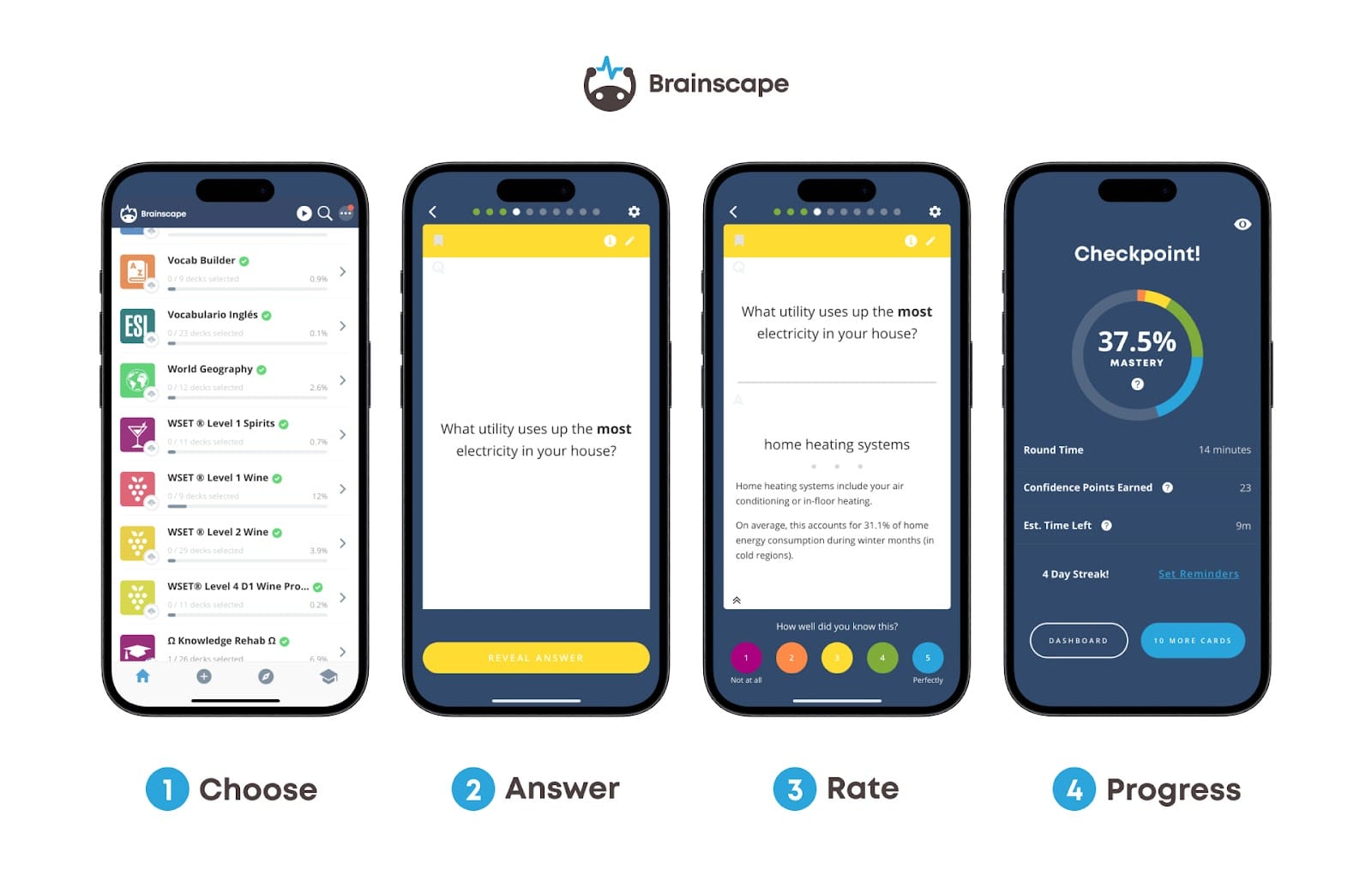Let’s be honest: when you hear “flashcards,” you probably picture a kid struggling to memorize the capitals of all 50 states. But flashcards aren’t just for kids—or for making your parents proud during road trips.
In fact, digital flashcards are an essential tool for adult learners, from college students to professionals preparing for an enormous suite of industries, from law, nursing, and medicine to wine, finance, and more.
Let’s break down why digital flashcards are so effective for adult education and how you can incorporate them into your learning journey, irrespective of your goals.
TL;DR – Are digital flashcards effective for adults?
Oh, are you in a rush? That’s okay! Here’s the TL;DR of this article… but if you want more in-depth explanations, please keep reading!
- Flashcards deliver information to your brain the way it was biologically designed to learn: through spaced repetition.
- Flashcards compel you to recall information from scratch—a tactic called active recall—which deepens your brain's neural pathways to that information much faster than through passive review (i.e. reading books or watching videos).
- Free flashcard apps like Brainscape make studying extremely accessible—allowing you to study anytime, anywhere, and on any device—which is important for older learners who work and are on the move.
- Are flashcards good for adults? Yes! They simplify complex, fact-heavy subjects into manageable bite-sized question-and-answer pairs, which Brainscape organizes into 10-flashcard study rounds.
- Seriously time-poor? Flashcards are the best tool for learning as quickly as possible even when you have no time to study.
Why flashcards are as good for adults as they are for kids
The human brain, no matter how old or how young, essentially learns the same way: through repeated exposure to a concept or skill. The more your brain perceives it needs to know something, the more it will hold onto that information.
Flashcards are the perfect vehicle for this kind of repetition. They break down knowledge-heavy subjects into individual facts, which you can repeat as often as you need to: more often if you struggle with a particular concept and less often if you're confident in that concept.

Digital flashcard apps like Brainscape automate this repetition at scientifically optimized time intervals that are calibrated according to your knowledge strengths and weaknesses, allowing you to learn so much more efficiently.
Flashcards also trigger active recall: by framing individual facts as a question, you're compelled to search through your mental database for that answer. This forces your brain to retrieve information from memory—like pulling a sweater from the back of a messy closet. This process strengthens neural connections and turns fleeting thoughts into durable knowledge.
Through these two game-changing learning techniques—active recall and spaced repetition—flashcards tap into the way the human brain is fundamentally wired to learn and helps them do so much more efficiently, whether you're a four-year-old learning your ABCs or a post-graduate science student.
The benefits of digital flashcards over paper
Remember those stacks of paper flashcards you used in high school? They were fine, but let’s face it: they were also boring, easy to lose, and a total pain to shuffle. Enter digital flashcards: the sleek upgrade that turns flashcards into a professional, efficient tool for adult learners.

Here’s why digital beats paper every time:
- Portability: With a free flashcard app like Brainscape, you’ve got your entire study arsenal on your phone. Waiting for coffee? Study. Stuck in a meeting that could’ve been an email? Study (discreetly).
- Multimedia integration: Digital flashcards let you add images, audio, and even video. For example, if you’re learning Spanish, you can listen to native pronunciations. Or if you’re tackling anatomy, you can include labeled diagrams. Goodbye monotony, hello engagement!
- Customization: Whether you’re prepping for the LSAT, brushing up on business jargon, or diving into a new language, our flashcard generator allows you to create flashcards that are uniquely tailored to what you want/need to learn.
- Progress tracking: Apps like Brainscape keep you motivated by showing you how far you’ve come—and how far you have left to go to reach 100% mastery. Think of it as gamifying your education.
- Ease: by taking the grunt work out of organizing your study materials, digital flashcards increase the likelihood that you follow through on your intent to study.
How flashcards help learning for specific goals
Whether you’re learning for career advancement, personal growth, or just to crush your trivia nemesis at the local pub, flashcards are ridiculously versatile.
Flashcards for certifications and professional development
Trying to pass a certification exam? Brainscape’s free flashcard app can break down dense material into digestible chunks. With premade flashcards available for a variety of industries (think law, finance, medicine, nursing, wine, language, and more), you can skip the stress of making your own cards and dive straight into studying.
Flashcards for language learning
Flashcards are a language learner’s best friend. From mastering vocab to conjugating verbs, they help you review high-frequency words while keeping your skills sharp. Digital flashcards with audio features can even help you perfect your pronunciation.
Flashcards for hobbies and interests
Have you ever wanted to memorize wine regions, bird species, or guitar chords? Flashcards make it easy to turn any passion into expertise. (Yes, becoming a wine snob is now officially a productive hobby.)
Why Brainscape is the best free flashcard app for adults
Brainscape isn’t just another app—it’s your all-in-one study buddy. Whether you’re tackling a new career skill or brushing up on old knowledge, Brainscape helps you conquer any learning challenge by empowering you to:
- Study twice as fast through its adaptive spaced repetition algorithm.
- Create custom decks with a sophisticated and fun flashcard generator.
- Stay motivated with clear progress metrics and a beautifully designed interface.
(And if you want to access our library of expert-curated premade flashcards or AI flashcard authoring tools, you can upgrade to Pro. But otherwise, you can make and study as many flashcards as you want for free… forever!)
Plus, Brainscape syncs across all your devices. Start studying on your laptop and pick up where you left off on your phone. No excuses, no wasted time.
Check out this video for tips on how to crush your study goals with Brainscape:
Verdict: are flashcards actually effective for older learners?
Short answer: absolutely.
Long answer: they’re effective because they’re rooted in cognitive science. By combining active recall, spaced repetition, and gamification, digital flashcards transform the way adults learn.
The key is to use them strategically. Pair your flashcards with other study methods, like practice tests and real-world applications. And remember, the best flashcard app isn’t just about one-off memorization—it’s about making the material stick.
Flashcards for adult learners are efficient, portable, and endlessly adaptable, making them a powerhouse tool for busy adults. Whether you’re learning for work, personal growth, or pure curiosity, flashcards can help you achieve your goals—faster and smarter.
(And yes, they're still great for kids.)
Ready to take the plunge? Download Brainscape today and see for yourself how this free flashcard app can transform your learning experience. Your future self will thank you.
—
Looking for more tips on efficient study as an adult? Check out these related articles:
- The secret to learning more while studying less: adaptive learning
- The importance of memorization in learning
- Learning a new language when you’re older and how to do it!
Sources
- Karpicke, J. D. (2012). Retrieval-based learning: Active retrieval promotes meaningful learning. Current Directions in Psychological Science, 21(3), 157-163.
- Lally, P., & Gardner, B. (2013). Promoting habit formation. Health Psychology Review, 7(sup1), S137-S158.
- Orbell, S., & Verplanken, B. (2010). The automatic component of habit in health behavior: Habit as cue-contingent automaticity. Health Psychology, 29(4), 374.
